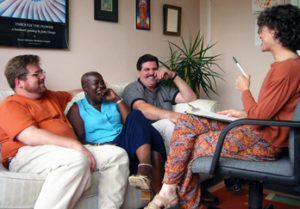Introduction
Polyamorous relationships are becoming more common, but finding a therapist who understands and supports these relationships can be difficult. In this article, we will discuss how to find a therapist who is knowledgeable about polyamory and can provide effective counseling to individuals and couples in polyamorous relationships.
What is Polyamory?
Defining Polyamory
Polyamory is the practice of having multiple romantic relationships with the consent of all parties involved. This can take many different forms, including triads, quads, or networks of multiple partners. Polyamorous relationships are built on open communication, honesty, and mutual consent.
Challenges of Polyamorous Relationships
Polyamorous relationships can be challenging because they go against traditional cultural norms and can be stigmatized by society. Finding a therapist who is supportive of polyamorous relationships can be difficult, as many therapists are not trained in this area or may have their own biases against non-monogamous relationships.
The Importance of Finding a Therapist Who Understands Polyamory
Benefits of Counseling for Polyamorous Relationships
Counseling can help individuals and couples in polyamorous relationships to navigate the challenges and complexities of these relationships. A therapist who is knowledgeable about polyamory can help clients to explore their feelings and desires, communicate more effectively with their partners, and develop strategies for maintaining healthy and fulfilling relationships.
Risks of Counseling with an Inexperienced Therapist
Working with a therapist who is not knowledgeable about polyamory can be harmful to clients. These therapists may hold negative biases about non-monogamous relationships or may lack the skills to effectively work with clients in polyamorous relationships. This can result in misdiagnosis, inappropriate treatment, or even harm to the client.
How to Find the Right Therapist for Polyamorous Relationship Counseling
Look for a Polyamory-Affirmative Therapist
A polyamory-affirmative therapist is one who is supportive of polyamorous relationships and has experience working with clients in these relationships. These therapists have an understanding of the unique challenges faced by polyamorous individuals and couples and can provide effective counseling.
Ask for Referrals
One of the best ways to find a therapist who understands polyamory is to ask for referrals from other polyamorous individuals or organizations. Online forums and social media groups can be helpful resources for finding recommendations.
Research Potential Therapists
Before scheduling an appointment with a therapist, it is important to research their background and experience. Look for information about their training, credentials, and any experience they have working with polyamorous clients.
Interview Potential Therapists
Once you have identified potential therapists, it is important to interview them to determine if they are a good fit for you. Ask questions about their experience working with polyamorous clients, their approach to counseling, and their attitudes towards non-monogamous relationships.

How do I choose a couples counselor?
Choosing a couples counselor can be an overwhelming task, but there are a few things to keep in mind when searching for a therapist:
- Look for a licensed therapist: It is important to choose a licensed therapist who has experience working with couples. Make sure to check their credentials and look for someone who has specialized training in couples therapy.
- Consider their approach: Different therapists have different approaches to couples therapy. Some may focus on communication, while others may focus on behavioral changes or the underlying emotional dynamics of the relationship. Look for a therapist whose approach resonates with you and your partner.
- Read reviews: Check online reviews from previous clients to get a sense of the therapist’s reputation and what others have experienced in therapy.
- Schedule a consultation: Most therapists offer a free consultation where you can ask questions and get a sense of whether the therapist is a good fit for you and your partner. Use this time to ask about their approach to therapy and what to expect in sessions.
What do psychologists think of polyamory?
Polyamory is a topic of growing interest and discussion in psychology. Polyamory refers to the practice of having multiple romantic or sexual relationships at the same time, with the knowledge and consent of all parties involved.
While there is no consensus among psychologists on the topic of polyamory, some psychologists view it as a valid and healthy relationship style for some individuals. Others may view it as problematic or potentially harmful to individuals and relationships.
Ultimately, psychologists aim to help individuals navigate their relationships in a way that is healthy and fulfilling for them. This may involve exploring the dynamics and challenges of polyamorous relationships, as well as helping individuals to develop communication and boundary-setting skills.
Is polyamory psychologically healthy?
The question of whether polyamory is psychologically healthy is a complex one, as there is no one-size-fits-all answer. Some individuals may find that polyamory allows them to experience a greater sense of intimacy and fulfillment in their relationships, while others may find that it creates more stress or conflicts.
Research on the psychological outcomes of polyamorous relationships is limited, but some studies suggest that individuals in consensual non-monogamous relationships report higher levels of relationship satisfaction, communication, and trust compared to individuals in traditional monogamous relationships.
However, it is important to note that polyamory is not for everyone, and individuals who choose to engage in polyamorous relationships should do so only with the informed consent of all parties involved. It is also important to prioritize communication, boundaries, and emotional well-being in polyamorous relationships, just as in any other relationship style.
Conclusion
Polyamorous relationships are becoming more common, but finding a therapist who understands and supports these relationships can be challenging. Working with a therapist who is knowledgeable about polyamory can help individuals and couples in polyamorous relationships to navigate the challenges and complexities of these relationships. To find the right therapist for polyamorous relationship counseling, it is important to look for a polyamory-affirmative therapist, ask for referrals, research potential therapists, and interview potential therapists.
FAQs
1. Can polyamorous relationships be healthy?
Yes, polyamorous relationships can be healthy and fulfilling when built on open communication, honesty, and mutual consent.
2. Do all therapists understand polyamory?
No, not all therapists are trained in working with clients in polyamorous.
Some common challenges faced by individuals and couples in polyamorous relationships include jealousy, navigating boundaries and agreements, and dealing with societal stigma and discrimination.
4. Can a therapist who is not knowledgeable about polyamory still be helpful?
It is possible for a therapist who is not knowledgeable about polyamory to still be helpful, but it is important for clients to advocate for themselves and ensure that the therapist is open to learning about and supporting polyamorous relationships.
5. Is polyamory right for everyone?
No, polyamory is not right for everyone. It is important for individuals to explore their own desires and preferences and determine what works best for them in their relationships.








